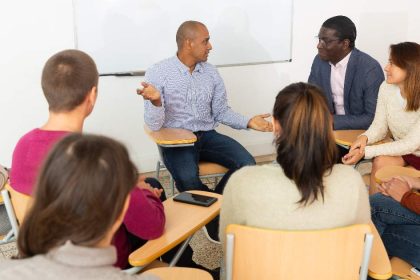Dr Simone Blom remembers teenage dreams of wanting to become an environmental scientist and save the world.
Today, as an emerging education researcher, she’s still deeply committed to making the world a better place, but her focus is on improving the classroom environment.
“I don’t think the education system is working if it is not working for everyone,” Blom says.
“People are quick to look at teachers, or parents, but we need to think about the system.
“It’s a system that doesn’t have the foundations to meet the needs of our children, our young people, or the planet.”
Ideals and inspiration
After completing secondary school, Blom did achieve those tertiary environmental science qualifications but says she found that the reality of the profession didn’t align with her deep values about caring for the earth’s precious ecosystems.
Instead, she returned to university to do a teaching degree discovered she had a gift for teaching STEM subjects (Science, Technology, Engineering, Mathematics).
To begin with, Blom divided her working life beyond university between the Marine and Freshwater Discovery Centre at Queenscliff, Victoria, and local high school science classrooms.
Although she didn’t consciously realise it at the time she was actually doing it, Blom was a living exponent of the school of thought that teaching science is best done in context – delivered through ‘real-world’ application and in ways that engage students with their existing knowledge or experience.
Throughout her 25-year career, she has taught science and environmental education in a diverse range of settings that include dolphin tour boat and remote Aboriginal communities. Obtaining her bus licence to make it easier for her to get students out of the classroom and into settings they could engage with – usually into nature – helped her bring science to life in ways that were educational and interesting.
“My whole philosophy is to connect with each other and to make it fun,” Blom says. “If we make schools too far removed from their real-world context and application it is hard for students to engage.
“The other thing that’s really important to me is equality with children.
“They are an equal part of the process of learning. Teaching is not something that’s done to them, it is done with them.”

Educating future educators
After a move to New South Wales, Blom has now taught teaching Southern Cross University (SCU) education students – something she describes as ‘an honour’, and a pursuit that has also seen her honoured with a prestigious citation from the Australian Awards for University Teaching and a Vice-Chancellor’s citation for Excellence in Student Engagement.
Next? A PhD.
To achieve that goal, Blom spent time with teachers in classrooms and discovered that typical research methods – such as quantitative or qualitative approaches – were falling short.
To counter that, she developed a new approach she calls ‘transqualitative’ research, and her findings have been published in the book, Returning Learning – A Diffractive, Posthuman Exploration of Nature Perceptions and Pedagogies with Early School Years’ Teachers.
“So much magic happening in classrooms with teachers goes unnoticed and unmeasured,” she says.
Professor Amy Cutter-Mackenzie-Knowles is Executive Dean of the Faculty of Education at SCU and is one of Dr Blom’s PhD supervisors.
“Our researchers are breaking new ground in how to respond to the sort of themes that were unpacked by the Teacher Education Expert Panel,” Cutler-Mackenzie-Knowles says.
“This then informs our courses and curriculum, producing graduates who we believe are distinctive and especially well-equipped for the contemporary classroom and modern world.”








